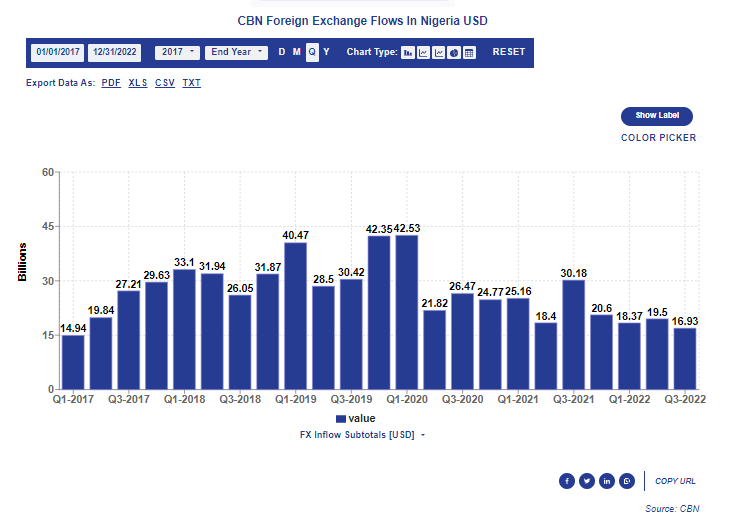Business and Brands
Dollar inflows to Nigeria falls to 5-year low at $16.9 billion in Q3 2022
Dollar inflows to Nigeria falls to 5-year low at $16.9 billion in Q3 2022
Nigeria’s dollar inflow dropped to a five-year low of $16.93 billion in the third quarter of 2022, a 43.9% fall from the $30.18 billion recorded in the same period of 2021 and a 13.2% decrease from the $19.5 billion received in the preceding quarter.
According to data obtained from the Central Bank of Nigeria (CBN), Nigeria attracted $54.81 billion between January and September 2022, which is 25.7% less than the $73.74 billion it attracted during the same time period in 2021.
Highlights of Forex flows
According to the data breakdown, the Nigerian economy received $7.28 billion in Q3 2022 through the CBN, representing 43% of all inflows during the study period, while $9.66 billion came in through autonomous sources.
On the other hand, outflows decreased from $11.03 billion in the previous quarter to $9.93 billion in Q3 2022. The CBN statistics show that while autonomous sources accounted for $1.39 billion, outflows through the CBN were $8.54 billion.
Accordingly, net FX flow through the Nigerian economy was $7 billion in Q3 2022, down 64.9% from $19.96 billion in the same quarter last year and down 17.3% from $8.47 billion in the preceding period.

The decline in Nigeria’s FX inflow may be attributed to reduced earnings from crude oil export, largely due to oil theft, and reduced production capacity amongst others. In the same vein, the economy has also not been appealing to foreign investors in recent times, considering the interest-to-inflation rate ratio, and its impact on the real returns of investors.
FX crunch impacting exchange rate: The Nigerian economy has suffered a significant FX crunch in recent years, especially since the covid-19 pandemic in 2020.
- A cursory review of the data from Nairalytics, the research website of Nairametrics, shows that Nigeria’s FX inflows in Q3 2022 are the lowest since Q1 2017, representing an over 5-year low.
- In the same vein, capital importation in form of direct, portfolio investments, and loans has also suffered a massive dip since the pandemic. A recent report indicated that capital inflows declined by 12.3% year over year to $4.89 billion between January and November 2022.
- Meanwhile, the CBN has continued to defend the naira at the official Investors and Exporters (I&E) window, keeping the rate rather stable at an average of N461/$1, at the expense of the external reserves, which has lost over $3.71 billion in fourteen months (From December 2021 to date).
- Meanwhile, the crunch in FX supply has also resulted in systematic devaluations in the official market. In 2021, the exchange rate at the I&E window averaged around N416/$1, before depreciating to over N434/$1 in 2022 and settling at N461/$1 in 2023.
Naira at risk of further devaluations: The exchange rate faces a further risk of devaluations in the future, owing to the tightened FX supply in the economy. For example, the CBN’s supply of FX in the official market has dipped significantly in recent times.
- Specifically, CBN forex supply to the I&E, SME, and Invisibles fell to $3.62 billion in Q3 2022 from $4.02 billion supplied in the same period of the previous year, representing its lowest supply since Q3 2020.
- Also, recall that the apex bank stopped the sale of forex to Bureau De Change operators in the country in 2021, which drove the rate at the black market from an average of N565/$1 to as high as N800/$1 before settling at N755/$1.
- The FX crunch at the official market is likely to gravitate to the black market, causing increased demand amidst underlying supply constraints.
Bottom line: The impact of Nigeria’s dwindling FX inflow cannot be overemphasized considering its significant impact on the exchange rate, inflation rate, and the broader economy. It is imperative for the government and the central bank to drive policies that will encourage dollar earnings into the country.
Although the CBN launched the RT200 FX scheme and the Naira4dollar policy in a bid to encourage forex inflows, they are yet to drive the numbers substantially.
Culled from Nairametrics.


 Top Stories18 hours ago
Top Stories18 hours agoBreaking: Abuja Stampede: 10 people including children feared de3d as they scramble for palliative…

 Top Stories18 hours ago
Top Stories18 hours agoBreaking: Okija Stampede: Many Feared De3d @ Nestoil Obi Jackson’s Yuletide Event

 News23 hours ago
News23 hours agoFG Sets Aside ₦27 Billion For Obasanjo, Gowon, Buhari, Others In 2025

 Sports23 hours ago
Sports23 hours agoTransfer: PSG to rekindle interest in Osimhen

 Sports23 hours ago
Sports23 hours agoUsyk, Fury to share $190m for rematch

 Top Stories23 hours ago
Top Stories23 hours agoGoods worth millions destroyed as fire guts Ibadan spare parts market [VIDEO]

 Sports22 hours ago
Sports22 hours agoNistelrooy Gives Update On Wilfred Ndidi’s Injury Ahead Of Leicester Vs Wolves Clash

 Top Stories23 hours ago
Top Stories23 hours agoPeter Obi Offers To Meet Dele Farotimi’s Bail Conditions






